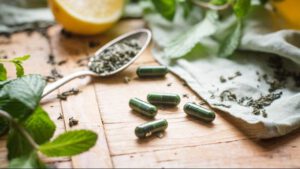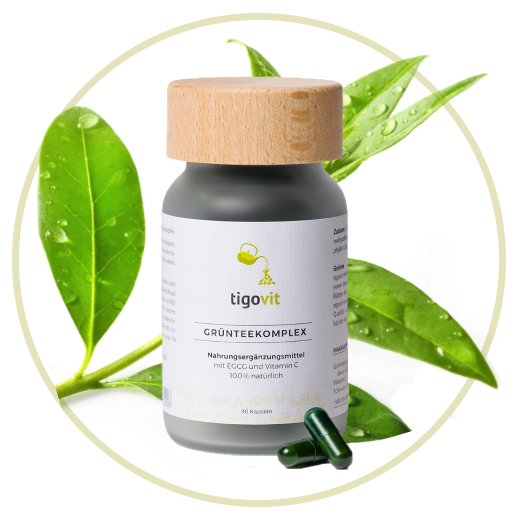
Food supplements: do you really need them? They are supposed to supplement our daily diet, but are they necessary for everyone? This article looks at the benefits and risks associated with dietary supplements and for whom they are really useful. It also looks at the different types of supplements and how they can be used to achieve the optimum effect of the supplements.
The most important facts at a glance
- Food supplements are not miracle cures and cannot replace a balanced diet; they are particularly useful for special groups such as pregnant women, top athletes or people with specific nutritional requirements.
- Important ingredients in food supplements are Vitamins, minerals, plant extracts and Amino acids, the Targeted supplementation for nutrient deficiencies can be used.
- Incorrect use or overdosing of dietary supplements can result in health risks; interactions with medication and contamination of poor-quality products are possible dangers.
Introduction
Food supplements have taken a firm place in our modern world. They are not medicines, but foods that are consumed in doses to supplement the normal diet. They come in various forms: from tablets to capsules to powders, and they all share the goal of providing certain nutrients in concentrated form. But one thing is clear: food supplements are not miracle cures. They can support a balanced diet, but by no means replace it.
It is a common misconception that everyone needs dietary supplements. For the average healthy person, regular intake is generally not necessary. However, certain groups of people, such as pregnant women or top athletes, can benefit from targeted supplementation. Benefit from an additional supply of nutrients through supplementation. It is therefore important to know your own requirements and to make a conscious decision as to whether and which nutritional supplements could be useful.
What are food supplements?
By law, food supplements are foods that are intended to supplement our daily diet. They are available in concentrated form and have the aim of Body with specific nutrients supply. However, they are not a panacea and are not a substitute for a varied diet or even medical treatment. These supplements are not intended to cure or prevent diseases, but to provide targeted support where there are gaps in the diet.
Despite the general assumption that dietary supplements are beneficial for everyone, their use is particularly recommended for people whose special living conditions require an additional supply of nutrients make this necessary. These include, among others:
- Pregnant women
- Top athletes
- Women who want to have children
- People with specific dietary restrictions
- Persons in challenging life situations with increased nutritional requirements
Important ingredients in food supplements
Food supplements can contain a variety of ingredients, ranging from essential nutrients such as vitamins and minerals to specific plant extracts and amino acids. In the following sections, we will take a closer look at some of the most common and important ingredient groups and their role in health.
Vitamins and minerals
Vitamins and minerals are essential nutrients that the body needs to function properly. They are involved in many important processes in the body, from strengthening the immune system to energy production, and therefore play a central role in dietary supplements. These essential nutrients are naturally present in many foods, but in some cases, for example through unbalanced diet or specific health conditions, to a deficiency in the come.
Supplementation with food supplements can help to compensate for such deficiencies. Vegans and vegetarians can benefit from targeted supplementation of vitamin B12 in particular, which is mainly found in animal products. Trace elements such as iron, which is important for transporting oxygen in the blood, can also be supplemented if necessary to support health and prevent deficiency symptoms.
Plant extracts
In addition to vitamins and minerals, food supplements often also contain plant extracts that are valued for their health-promoting properties. A well-known example is green tea, which is not only known for its invigorating effect due to the caffeine it contains, but also for its rich variety of flavours and benefits. Plant extracts such as these are used for their positive effects when ingested often used in food supplements.
Another important plant extract is lady's mantle (Alchemilla), which comes from the rose family and is successfully used in traditional herbal medicine. The in Lady's mantle contains tannins, bitter substances and essential oils make it a valued ingredient in many dietary supplements. Other plant components with traditional uses are also frequently found in these products and offer natural support in daily life. There are various dietary supplements based on lady's mantle and other plants, which enable the enjoyment of beneficial herbs.
Amino acids
Amino acids are the building blocks of proteins and play a crucial role in the human body. They are also known as the "building blocks of life" and are essential for the development of muscle tissue and many other important functions. In the context of dietary supplements, it is often discussed whether and to what extent they should be taken in addition. For most people, especially recreational athletes, it is possible to cover the need for amino acids through a balanced diet.
Nevertheless, there are situations in which amino acid supplementation can be considered. For example, semi-essential amino acids may be produced in insufficient quantities following muscle injury, so additional intake may be helpful. However, it is important to note that the isolated intake of individual amino acids in the form of supplements is often unnecessary and expensive, and in some cases can also have side effects. Amino acid complexes are a suitable support for people who follow a vegan and vegetarian diet.
Advantages of food supplements
Food supplements undoubtedly have their place when it comes to this, to specifically compensate for nutrient deficiencies and support health. Omega-3 fatty acids, for example, are known to regulate blood pressure and support heart and brain function.
Targeted supplementation can therefore have a positive effect on health, especially if it is tailored to individual nutrient deficiencies.
However, it is crucial to maintain realistic expectations and not view supplements as a panacea. They cannot and should not be seen as a substitute for a healthy diet or medical treatment. In some cases, such as a proven vitamin D deficiency, supplementation can improve muscle function or the body's defences, provided you also ensure sufficient exposure to sunlight.
Risks and side effects
As valued as dietary supplements may be in some cases, taking them also harbours risks. An overdose of Micronutrients can have dangerous health effectswhich is why the recommended daily dose should not be exceeded. Dietary supplements can also interact with medications, which can strengthen or weaken the effect of the medication.
The improper manufacture of food supplements is particularly dangerous, as it can lead to contamination with pathogens, heavy metals or carcinogenic substances. It is therefore important to choose products from trustworthy manufacturers and to always seek the advice of a doctor or other health expert when taking dietary supplements.
Important: sustainability for food supplements
Food supplements can not only affect our health, but also the environment. Sustainability in this area means environmentally friendly production and packaging in order to reduce the ecological footprint of products. An increasing number of consumers attach importance to sustainably produced food and food supplements, which is prompting manufacturers to adapt their processes accordingly. Refillable packaging, for example, has a positive impact when it comes to avoiding waste.
But caution is advised: The term "sustainable" is often misused for marketing purposes, and not every product advertised as such actually fulfils the criteria of true sustainability, a phenomenon known as greenwashing. To avoid greenwashing, consumers should look for transparency, independent certifications and clear communication of sustainability efforts by companies.
Choosing the right dietary supplements
Choosing the right dietary supplements can be a challenge. It is important to consider individual health goals and needs. For example, vegetarians or vegans could benefit from targeted vitamin B12 or iron supplementation. In order to choose the right products, the advice of medical professionals such as doctors, alternative practitioners or nutritionists can be valuable.
In addition to considering individual aspects, you should also pay attention to possible allergies or intolerances and not disregard the quality of the products. High-quality food supplements from reliable manufacturers are generally more effective and safer than cheaper alternatives. A careful check of the labelling provides information about ingredients, dosages and possible warnings. You can also write to the manufacturer; good customer service will be happy to provide you with reliable information on quality, origin and environmental protection.
Application and dosage
The correct use and dosage of food supplements is essential for their safety and effectiveness. It is important to adhere to the dosage instructions and avoid high intake levels by taking several products at the same time. Expert advice from a doctor or nutritionist can help you find the right dosage for your individual needs.
Food supplements for special needs
Certain life circumstances and eating habits can place special demands on the supply of nutrients. Vegans, for example, can benefit from a targeted intake of nutritional supplements to compensate for a possible deficiency of vitamins such as B12, vitamin D or trace elements such as iron. For vegan athletes in particular, it is advisable to regularly check their iron status and ensure their calcium intake.
For different target groups such as children, teenagers, pregnant women, senior citizens and athletes, there are specially adapted nutritional supplements that are tailored to the specific needs of these groups. However, it is important to note that not every multi-preparation is suitable for everyone.
Summary
So what now - are dietary supplements useful or not? They certainly have value and can have a strong influence on quality of life if they are used in a targeted and considered manner. They can compensate for certain nutrient deficiencies and contribute to health, but are not a substitute for a balanced diet or medical treatment. It is important to choose products carefully and with consideration of individual needs. The source of supply is also important: buy from reputable retailers who do not have their products produced in low-wage countries and obtain their raw materials directly from the manufacturer. Look for laboratory certificates and contact customer service if you have any questions about the origin, intake and quality.
It is also extremely important to pay attention to the quality of food supplements, their correct use and the sustainability of their production. This is the only way to ensure that the positive aspects of these products can be utilised without endangering your own health or the environment.
So let's choose wisely and see supplements for what they are: a complementary measure that can be a great part of a healthy lifestyle.
Frequently asked questions
Are dietary supplements necessary for everyone?
Food supplements are not usually necessary for the average healthy person, but they can be useful for certain groups of people such as pregnant women or top athletes.
Can food supplements replace a balanced diet?
No, dietary supplements cannot replace a balanced diet, but merely serve to supplement specific nutrients.
What are the risks associated with taking dietary supplements?
When taking dietary supplements, risks such as overdose and interactions can occur. It is important to adhere to the recommended dosage and to choose products from trustworthy manufacturers. It is best to consult a healthcare professional.
How can I ensure that my dietary supplement is sustainable?
To ensure that your dietary supplement is sustainable, look for transparency and independent certifications in manufacturing and packaging. Avoid products that are greenwashing and cannot demonstrate any real sustainability efforts.
What should I consider when choosing food supplements?
Pay attention to your individual health goals and needs, consult experts and be aware of possible allergies or intolerances. Choose high-quality products from reliable brands.






Leave a Reply